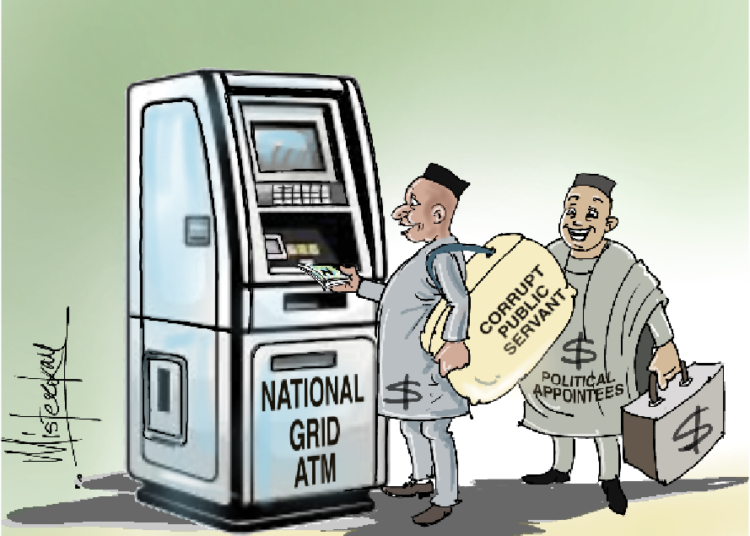Thursday’s collapse of the National Grid made it the 11th since January 2024. For a country committed to realising its industrialisation goal that is facing an uphill task as shown in decreasing level of power generation, the recurring breakdowns of the grid remain forerunners of failed attempts. More pitiable and appalling is that those assigned with the management of the grid are never reprimanded over what is becoming the norm rather than exception.
This latest grid collapse was only able to stir a press statement from the Office of the Minister of Power, Chief Adebayo Adelabu. The minister was quoted to have ordered the Transmission Company of Nigeria (TCN) and other relevant agencies in the ministry to commence the immediate implementation of the recommendations of the inter-agency committee set up to address the incessant grid collapses in the power sector.
Transmission Bug
More than 11 years after the Power Holding Company of Nigeria (PHCN) was privatised, the deliberate refusal by the government to privatise power transmission has translated into a horrifying nightmare in the nation’s dream of ending power blackouts. In unbundling PHCN into generating, transmission and distribution companies, the administration of former President Goodluck Ebele Jonathan had hoped that light would overwhelm darkness and power outages that have defied solutions for decades.
As I write this piece yesterday, a former minister of power is currently standing trial over diversion of over N30 billion meant for transmission projects to buy choice property in Abuja and other parts of the world. The Tinubu administration remains prostrate in realising its promise of increased energy for Nigerians. Still treading the old path fraught with corrupt practices that have turned projects associated with power transmission into Automatic Teller Machine (ATM) for political appointees and senior technocrats, collaboration with foreign contractors has turned Nigeria into an unfathomable darkness.
The current year has been a terrible moment for the dismal performance of the power sector. Not only were power distributing companies, popularly known as DisCos, allowed to hike tariffs, the regulatory agency, the National Electricity Regulatory Commission (NERC) approved the categorisation of energy consumers into various bands for increased revenue.
Old But New Problems
As it is, the inheritors of the old PHCN have only embraced assets and not liabilities. Apart from power generation that is often subjected to the vagaries of the weather, especially during the raining season, the absence of rain is not good news for many hydro-power generating systems, especially the Kainji dam. The categorisation of customers into various bands has only succeeded in fleecing customers of their money without enjoying commensurate power supply. The outcome of this categorisation has only forced power distributing firms to deny certain areas power in a bid to justify the horrendous tariffs imposed on customers on Band A.
As part of the privatisation drive to develop the energy sector, generating and distribution companies, as part of the agreements, were mandated to attract Foreign Direct Investments (FDIs) in improving their dilapidated infrastructure. Over a decade after the privatisation, most of these power companies have become mere suitcase firms with no single FDI, with some of them placed under receivership for loans obtained but not paid.
Despite the conditions attached to payment of tariffs on categorised energy customers, NERC continues to look the other way, while Nigerians are fleeced of their hard-earned money. Customers on Band A are supposed to enjoy 20-24 hours of electricity supply, but most areas inhabited by Band A energy consumers still suffer from power outages due to incessant power cuts for days without compensation.
So, why should customers on Band A continue to pay heavily for power not supplied, while the NERC looks the other way? With increase cost of energy becoming unbearable to most Nigerians, the epileptic state of the power, as shown in the constant collapse of the grid, Nigeria’s failure to industrialise is further accentuated by poor power generation made worse by incapacity to wheel the little amount of megawatts produced by the generating companies.
Escaping From Darkness
Just as the nation is unable to break free from the murderous clasp of insurgency and other forms of criminalities, the current incessant failure of the grid is caused by greedy technocrats, assisted by corrupt political leadership, to help themselves in looting the nation’s treasury. Nigerians know too well that when desperation is unleashed on the public psyche, the government may be forced to bring out money.
The current efforts at implementing the high-points of the federal government’s inter-agency committee could turn out a prologue to more attempts at appropriating more funds to further drain the system. This week, a video clip trended in which Tinubu, while campaigning for the 2023 presidential poll, called on Nigerians not to vote for him for a second term if he did not resolve problems militating against power outages.
The power transmission section has been entrapped in the maze of confusion and corruption, with no consequences on those who have failed the nation in managing the grid. The power minister and management of the TCN must be shown the exit door. The billions of naira misappropriated for the management of the grid must be accounted for in order to stamp out the crippling corruption ravaging the sector.
Resolving the present quagmire called the power sector is impossible without tackling problems associated with financial malfeasance trailing the management of the energy sector. The government must take its hands off the power sector and allow for private management according to global best practices. Just as power generating companies are leaving no stone unturned towards improving power generation, both transmission and distribution companies must rise to the challenge and distribute energy in powering the nation to its envisaged destiny.





